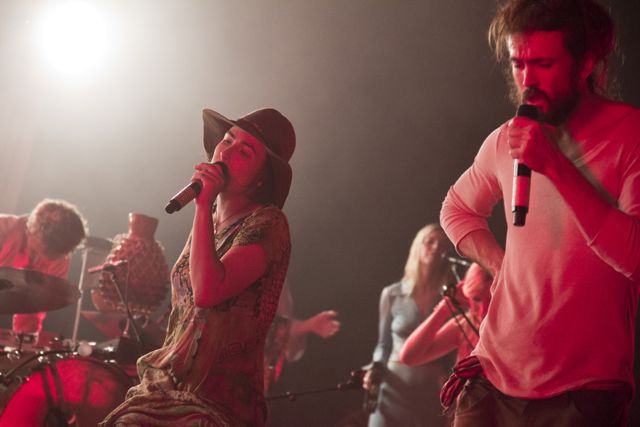Before the 10 or 12 or 14 (depending on how you were counting) members of Edward Sharpe and the Magnetic Zeros took the stage at the Thomas Wolfe Auditorium last week, the set resembled a flea market more than the floor plan for a band. And, in fact, the band itself — a spawning operation that fills the stage — is a bit of a flea market orchestra, what with the array of hats, the vintage clothes, the pieced-together drum kits (there are two, one of which includes a pedal that shakes a bead-covered gourd) and the everything-but-the-kitchen-sink collection of instruments. Banjo, fiddle, auxiliary percussion, tuba, cornet, piano, keyboard, accordion, standup bass and guitars. There’s probably more, too.
Edward Sharpe (who’s real name is Alex Ebert) positions himself as the bandleader, in the most theatrical sense. He’s the king of the gypsies, the grand master, the The Rum Tum Tugger of the Jellicle Ball. Some research on Ebert revealed that the idea for the Sharpe character came to him while he was recovering from a break up and from addiction; a step away from the L.A.-based life of parties and excess, Ebert fashioned Sharpe as a messiah of sorts, though one who still struggles with earthly desires. Namely women. More on that in a moment.
The messiah thing seemed true — early in the first song (“Man on Fire”), Ebert (who doesn’t play an instrument on stage) was already in the pit with the audience. And wearing a garland on his head — either a wreath of flowers or a crown of thorns. Or perhaps just an innocuous grapevine headband. He remained in the crowd through half of “40 Day Dream,” returning to the stage to sing “That’s What’s Up” as a duet with Jade Castrinos. It was with Castrinos (a calm force on the stage and a breezy, mellow foil to Ebert’s bombast and pomposity) that Ebert launched both a romance and the Magnetic Zeros. The pair have since split, romantically (The Guardian reported in July that he was was expecting a child with Roehm Hepler-Gonzalez) but still perform together — at times, intimately and tenderly — on stage.
Not that the band needed a warm-up, but by the time they reached “Janglin,” with its movements and tempo changes, they had definitely hit their stride. That song, which begins with the poppy, happy melody probably best known from the Ford Fiesta commercial, evolves into a darkly swashbuckling motif. At that point, the music stopped while Ebert accepted a card from someone in the audience. He read it out loud, along with an excerpt from a religion-heavy poem (the rest of the crowd was demanding a return to music, and one of the musicians was taking photos of the audience) and then a shorter poem. And then he picked up where he’d left off with “Janglin.”
Religion (especially the personal relationship to God) runs like a thread throughout Edward Sharpe’s material. Ebert doesn’t shy away from it — “I Don’t Wanna Pray,” which he began a cappella, leads with the chant, “I love my god, god made love.” And “Up From Below” deals with the idea of death.
Also thematic through the show: Ebert’s perceived improv — his anecdotes and off-beat comments leading into songs, and then discussions and directives to the band. All of these suggested that the show was off-the-cuff, but can a 10-member band operate off-the-cuff? Seems unlikely. On the other hand, Ebert’s band operated like a machine. An organic flea market machine, but a very professional and polished organic flea market machine. At one point, someone in the audience started singing a tune and Sharpe asked, “How do you know that one?” He began to whistle the melody into his mic, and the band immediately came in behind him.
Castrinos played guitar on “Fiya Wata,” from this year’s Here; Castrinos wrote that song, which stands out with its cool 60s-era folk/country-rock feel. Which is kind of where the band derives its sound. If I were doing the music version of W Magazine‘s Inspiration Equation feature, I’d say Edward Sharpe and the Magnetic Zeros = earthy California country rock + 1960s stoned soul picnic + Avett Brothers folk-punk roots-rock + Sufjan Stevens theatrical orchestra.
Taking a break from the somewhat formulaic (to this band) a capella lead in-to full band instrumentation-to chorus of voices songs, Ebert asked the violinist to play “a fiddle jam thing we all love.” It sounded like an Irish reel at first, but soon three musicians came in one drums, along with a piano that would have been at home in an wild west saloon. The interlude proved (not that this needed proving) that the band on its own is all stellar musicians and, while Ebert is a charismatic leader, it’s really the music that holds up the lyrics.
Photos by John Zara.




Before you comment
The comments section is here to provide a platform for civil dialogue on the issues we face together as a local community. Xpress is committed to offering this platform for all voices, but when the tone of the discussion gets nasty or strays off topic, we believe many people choose not to participate. Xpress editors are determined to moderate comments to ensure a constructive interchange is maintained. All comments judged not to be in keeping with the spirit of civil discourse will be removed and repeat violators will be banned. See here for our terms of service. Thank you for being part of this effort to promote respectful discussion.